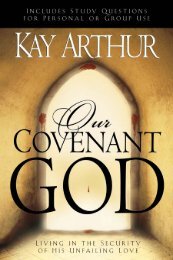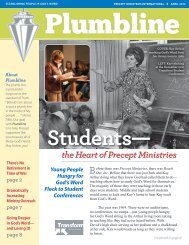Romans - Bible Study - Precept Ministries
Romans - Bible Study - Precept Ministries
Romans - Bible Study - Precept Ministries
You also want an ePaper? Increase the reach of your titles
YUMPU automatically turns print PDFs into web optimized ePapers that Google loves.
2<br />
PRECEPT<br />
UPON<br />
PRECEPT<br />
<strong>Romans</strong> 3<br />
Lesson 1, Overview<br />
There are several approaches you can take to discover when a book was<br />
written. The best approach is to go directly to the book being studied and<br />
observe the text by looking for names, places, events, etc. This approach is<br />
called inductive study. Inductive study begins with the subject or object itself,<br />
rather than with a study of books about that subject or object. After<br />
completing the observations, the student then goes to commentaries or <strong>Bible</strong><br />
handbooks for additional information that cannot be gleaned from the text.<br />
Starting with the text itself is an invaluable study habit because reference works<br />
on that text will often vary in their opinions and conclusions.<br />
a. Read <strong>Romans</strong> 1:8-13 and <strong>Romans</strong> 15:18-28 for clues as to when in Paul’s<br />
life this letter was written.<br />
b. Note where he has been, where he desires to go, and why.<br />
3. Many times the people mentioned give us clues as to time and place. For<br />
example in <strong>Romans</strong> 16:1-4, Paul mentions Phoebe, Prisca (Priscilla), and<br />
Aquila as having been his helpers.<br />
a. If you have time and access to a concordance, look up their names and find<br />
other references that would connect them to Paul. Note your observations.<br />
If you cannot check a concordance, go on to “b.”<br />
© 2004 <strong>Precept</strong> <strong>Ministries</strong> International














